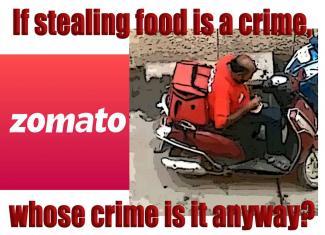
(Reproduced from arre.co.in, December 12, 2018)
THE Zomato rider seen eating a customer’s order in a viral video, has been sacked. Congratulate yourself, Twitter. What made the man take a bite was, quite possibly, a horribly unfair system that had him working ungodly hours, to deliver food he could never afford for himself, to people who likely never tip.
It started with a Twitter user sharing the video online, tagging Zomato and asking the company to provide answers for its service provider’s behaviour. The floodgates of internet outrage were opened, and online commenters attacked Zomato for failing to ensure the safety of their takeout.
The media attention prompted the company to announce that it had terminated the rider’s employment, and would focus on coming up with “tamper-proof packaging” to prevent incidents like this in the future. So the rider lost his job, and we have to struggle with parcels sealed tighter than Tutankhamun’s tomb in the future. That’s what I call a Lose-Lose Situation.
But sealing the next package tighter and firing the rider won’t help address the real cause of the problem. It wasn’t a faulty container that made the man take a bite of the food. It was, quite possibly, a horribly unfair system that had him working ungodly hours for a pittance, to deliver food he could never afford for himself, to people who probably never tip because delivery charges were included in the bill. By making him the butt of jokes and spinning the incident to revolve around our consumer rights, we’ve ignored the human story behind the viral video.
A search on the job portal Indeed.co.in shows the average monthly salary of a Zomato delivery driver is ₹18,971. In Mumbai, that isn’t even enough to afford rent in a run-down chawl, let alone the luxury of having ₹700 bowls of pasta from Indigo Deli delivered home. On Quora, a former campus brand ambassador for Zomato shared that riders are often paid a paltry ₹60 per order (even if it’s a late-night order), with bonuses as incentives for completing a greater number of orders. Riders also have to bear all the expenses for fuel, and pay out of their own pocket for any damaged food items.
The life of a delivery boy is far from glamorous – and if you live in a metropolis, you’ve probably cursed one for having a deathwish. In August this year, two Zomato delivery executives died in road accidents in Nagpur, leading to a protest on the streets from the other riders. What had started in Nagpur in August, spread to Mumbai by September, as delivery executives of Zomato and other online food delivery services like Foodpanda and Swiggy, raised their voice against the unfairness of their working conditions.
That’s why it’s easier to crack jokes and feign outrage over the Zomato rider who dared to take a bite. Doing otherwise would require looking past our initial reaction of “eww jhoota khana” and acknowledging the inequalities that stare us in the face every time we open the door to collect our orders. Hopefully, the rider can find another job, one that gives him a real lunch break and pays him enough to buy a real meal, instead of sneaking in scraps.
As for us, instead of insisting that Zomato, Swiggy, and the other delivery services protect our precious parcels from ravenous riders, perhaps we should take to Twitter and ask them to give their employees better working conditions and quality of life. Don’t hate the player, hate the game. And the next time you order a pepperoni pizza, add a side of empathy, please.
Liberation Archive
- 2001-2010
-
2011-2020
- 2011
- 2012
- 2013
- 2014
- 2015
- 2016
- 2017
- 2018
-
2019
-
JANUARY-2019
- Oust the Fascist Modi Regime! Rescue India, Rebuild India!
- Assembly Elections 2018: A Blow To Fascist Politics
- The Elitist Reaction to the Zomato Delivery Man
- More Orders, More Money
- Why I Stole food
- Kisan Mukti March : When United Peasant Resistance Defused The Fascist Aggression
- Kisan Mukti March : The Farmers' Freedom March
- Kisan Mukti March : Civil Society and Opposition Parties Come out in Support
- MANIFESTO OF INDIAN FARMERS
- Farmers' Unity will become the Biggest Force in Fighting Fascism
- Save Our Farmers
- The Fraud of Farm Suicide Numbers
- Agrarian Crisis = Nation's Crisis
- Sinking in a Sea of Debt
- Why The Market Has Not Worked For Farmers
- Agrarian Crisis: A Crisis of Women Farmers
- Overworked, Underpaid, Unrecognised: Bihar ASHAs on Indefinite Strike
- Seminar: 'Women's Rights and Increasing Attacks on Democracy'
- Supreme Court as Custodian of the Constitution
- Comrade Vinod Mishra's Bhojpur
- Why Supreme Court Order Doesn't Amount to 'Clean Chit' to Modi Government on Rafale
- All Over The World, Home Is The Most Unsafe For Women
- FEBRUARY-2019
- MARCH-2019
- APRIL-2019
- May-2019
- LIBERATION, JUNE 2019
- Liberation JULY 2019
- LIBERATION, August 2019
- Liberation, SEPTEMBER 2019
- Liberation, OCTOBER 2019
- Liberation, NOVEMBER 2019
- Liberation, DECEMBER 2019
-
JANUARY-2019
- 2020
- 2021-2030
Charu Bhawan, U-90, Shakarpur, Delhi 110092
Phone: +91-11-42785864 | Fax:+91-11-42785864 | +91 9717274961
E-mail: info@cpiml.org







